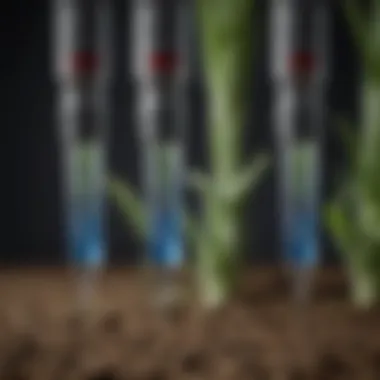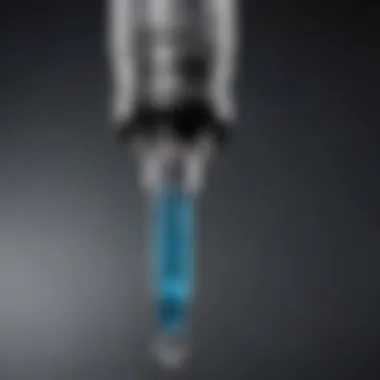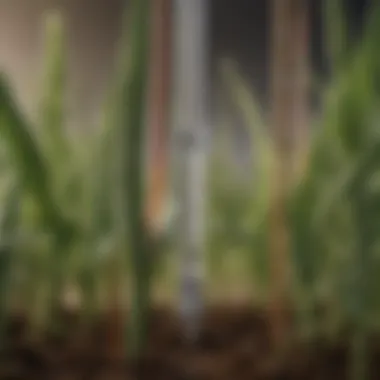Exploring Polypropylene Syringes in Agriculture


Intro
Polypropylene syringes have emerged as vital tools within the agricultural sector. Their lightweight nature and chemical resistance make them ideal for various applications ranging from seed treatment to pest management. Understanding these syringes better helps farmers enhance their practices, contributing to both efficiency and sustainability.
In agriculture, the use of appropriate tools is crucial. With the rise of environmental concerns and the need for sustainable practices, many in the industry turn to materials like polypropylene. This article delves into their applications and the implications of using polypropylene syringes in farming and horticulture.
By examining their properties and benefits, we can draw clearer connections between their use and ongoing agricultural trends. Furthermore, evaluating the environmental impact and industry standards will ensure farmers can make informed choices about incorporating these syringes into their workflows.
"The right tools and materials can significantly influence productivity and sustainability in agriculture."
Therefore, this article aims not just to inform but also to provide actionable insights, ensuring that readers can apply this knowledge in their agricultural endeavors.
Prolusion to Polypropylene Syringes
Polypropylene syringes play a significant role in the agricultural sector, providing essential tools for various applications. Their design and material properties make them suitable for a range of tasks, from pesticide application to seed treatment. Understanding these syringes enhances knowledge of modern farming practices and offers insights into their benefits and limitations.
These syringes are particularly noteworthy due to their compatibility with agricultural chemicals. They can safely hold, store, and transfer various substances without compromising their integrity. This ensures effective application while minimizing risks related to chemical reactions.
Definition and Characteristics
Polypropylene is a thermoplastic polymer known for its robustness and versatility. Syringes made from polypropylene have unique characteristics that set them apart from those made from other materials, such as glass or rubber. They are lightweight, resist many acids and bases, and provide excellent clarity, allowing users to view the contents easily. Furthermore, polypropylene syringes exhibit low moisture absorption, which is important in agricultural settings where liquids may evaporate or alter performance.
These syringes are usually available in various sizes, catering to different needs in agricultural applications. Their design often includes a plunger mechanism that ensures accurate measurement and delivery of liquids. Overall, their construction satisfies many agricultural demands, making them a popular choice among farmers and horticulturists.
History and Development
The development of polypropylene syringes has evolved alongside advancements in plastic manufacturing technologies. Initially, glass syringes were the norm in many fields, but they presented challenges such as breakage and contamination. The introduction of polypropylene in the mid-20th century revolutionized syringe production.
As awareness grew regarding the environmental drawbacks of glass and metal containers, polypropylene emerged as a preferred alternative. The material offered a lighter and more durable option, leading to increased use in various sectors, including healthcare and agriculture. Over the years, manufacturers refined the design and functionality of polypropylene syringes, enhancing their usability and safety features.
The result of this development is a product that not only meets rigorous standards but also adapts to the needs of modern agriculture. Consequently, farmers have embraced polypropylene syringes as reliable tools necessary for precise fluid applications in various agricultural practices.
Material Properties of Polypropylene
Polypropylene, a type of thermoplastic polymer, is largely used in the manufacturing of syringes due to its distinct material properties. Understanding these properties is crucial for those in agriculture, as they directly affect the functionality, reliability, and longevity of syringes used in various agricultural practices. This section delves into two fundamental aspects of polypropylene: chemical resistance and durability. These properties underscore the significance of polypropylene syringes in the agricultural sector.
Chemical Resistance
Chemical resistance is one of the key attributes of polypropylene syringes. They exhibit a remarkable ability to withstand a wide range of chemicals without degradation. This makes them ideal for agricultural applications where pesticides and fertilizers are frequently used.
- Inertness: Polypropylene does not react with most agricultural chemicals. This inertness ensures that there are no unwanted interactions that could compromise the purity or effectiveness of the substances being applied.
- Wide Range: They can handle various formulations of pesticides, herbicides, and liquid fertilizers, making them versatile for different farming needs.
- Safety Aspect: Using polypropylene syringes reduces the risk of chemical reactions that might pose a threat to both crops and the environment.
Durability and Strength
Durability and strength are integral attributes that enhance the usability of polypropylene syringes in farming. Unlike glass or some other plastic options, polypropylene is notable for its robustness.
- Impact Resistance: These syringes are less likely to break upon impact. This is particularly important in field conditions where rough handling may occur.
- Temperature Resistance: Polypropylene can withstand a range of temperatures. This property enables the syringes to perform well in different environmental conditions, from cold mornings to hot afternoons.
- Longevity: Durable syringes lead to extended use, reducing the frequency of replacements. This aligns with cost-saving practices within agricultural operations.
"The durability of polypropylene syringes contributes to their widespread adoption in the agricultural field."
Farmers and agricultural enthusiasts benefit from these strong and lasting syringes, as they represent a wise investment for effective and sustainable farming.


Applications in Agriculture
The use of polypropylene syringes in agriculture plays a critical role in enhancing productivity and efficiency across various farming practices. These syringes are lightweight, versatile, and resistant to a wide range of chemicals, making them suitable for multiple applications. Understanding these applications helps farmers make informed decisions about their agricultural methods.
Pesticide Application
Pesticide application is one of the primary uses of polypropylene syringes in agriculture. These syringes allow precise and controlled delivery of pesticides directly to plants. The accuracy of dosage is crucial, as proper application reduces the chance of overuse and minimizes environmental impact.
Farmers appreciate the ability to target specific areas, reducing waste and preventing excessive runoff. Polypropylene's chemical resistance ensures that the syringe maintains its integrity, even when handling harsh substances. This is vital for safety and effectiveness during applications.
Fertilizer Injection
The injection of fertilizers using polypropylene syringes represents another practical application in agriculture. This method allows for deep delivery of nutrients into the soil, enhancing frut growth. When fertilizers are injected directly into root zones, plants can absorb nutrients more efficiently.
Using polypropylene syringes for this application is also cost-effective. They eliminate the need for bulky equipment often required for traditional fertilizer spreaders. In addition, the ease of handling ensures that farmers can apply fertilizers quickly, saving time and labor.
Seed Treatment
Seed treatment is essential for improving germination rates and protecting seedlings from diseases. Polypropylene syringes are often used to apply protective chemicals or growth stimulants directly onto seeds before planting. This method can significantly enhance the growth potential of crops.
By using a syringe, farmers can ensure that each seed receives the appropriate amount of treatment. This targeted delivery reduces waste while increasing the effectiveness of the products used. Additionally, this adaptability benefits both small-scale and large-scale agricultural operations.
Fluid Transfer
Polypropylene syringes are well suited for fluid transfer tasks in agriculture. They provide easy and safe means for transporting liquids such as water, nutrients, or other necessary solutions used in agricultural processes. Their design allows for minimal spillage, ensuring that resources are conserved.
Moreover, the visibility of contents through the transparent barrel aids in accurate measurement, which is crucial when dealing with different liquid mixtures. Farmers can swiftly transfer, mix, or measure important solutions during daily tasks, enhancing overall operational efficiency.
The versatile applications of polypropylene syringes directly contribute to better productivity and sustainable practices in agriculture.
Benefits Over Other Materials
The topic of benefits provided by polypropylene syringes is essential in the context of agricultural practices. In the competitive realm of farming, where efficiency and cost-effectiveness can make a significant impact, understanding these advantages helps farmers and agricultural enthusiasts make informed choices. Polypropylene syringes stand out due to their unique properties that align with the needs and challenges of modern agriculture.
Cost-Effectiveness
Cost-effectiveness is often a paramount consideration for farmers. Polypropylene syringes offer an affordable solution for various agricultural applications. They are less expensive than syringes made from glass or other materials. This affordability allows farmers to purchase larger quantities without heavy financial strain.
- The lower manufacturing costs translate to lower retail prices.
- In comparison to glass, polypropylene syringes are less likely to break during handling, reducing the total cost associated with waste and replacements.
- Their durability means that fewer syringes are needed over time. This efficiency further lowers costs in the medium and long term.
This economic advantage is important as farmers often operate on tight margins. Investing in tools that provide high utility at a lower cost can enhance the bottom line over time.
Ease of Use
Ease of use is another key benefit when employing polypropylene syringes in agriculture. These syringes are designed to be user-friendly, which is particularly beneficial during fieldwork where conditions can be less than ideal.
- Their lightweight nature facilitates ease of handling, especially over long periods. This aspect helps reduce fatigue, allowing for better focus and efficiency during work.
- The clear material of polypropylene typically enables clear visibility of the contents. Farmers can easily monitor the dosage and make adjustments when necessary.
- Most polypropylene syringes are designed for single-use. This feature simplifies logistics as it eliminates the need for extensive cleaning routines, ensuring that they are ready for immediate use.
Overall, the combination of cost-effectiveness and ease of use positions polypropylene syringes as a favorable option compared to other materials used in agriculture. They not only fit well into the practicalities of daily tasks but also contribute to economic efficiency, making them invaluable tools in modern farming.
Environmental Considerations
The discussion surrounding environmental considerations in the context of polypropylene syringes cannot be overstated. These syringes play a significant role in modern agricultural practices, and understanding their environmental impact is crucial for farmers and enthusiasts alike. The focus on sustainability in agriculture is now more important than ever, leading to an examination of the materials used in farming tools, including syringes.


Recyclability of Polypropylene
Polypropylene is a thermoplastic polymer widely recognized for its recyclability. Unlike some materials that complicate disposal processes, polypropylene can be reprocessed and transformed into new products. This characteristic makes it a preferred choice for environmentally conscious farmers. By participating in recycling programs, agricultural professionals can reduce waste contributing to landfills.
Recycling polypropylene syringes involves a few key steps:
- Collection: Proper sorting and collection of used syringes.
- Cleaning: Ensuring that syringes are free from any chemical residue.
- Processing: Sending them to facilities specializing in recycling polypropylene.
Engaging in these practices helps maintain a sustainable approach in agriculture, promoting a circular economy. By utilizing recycled materials, farmers can minimize their ecological footprint while benefiting from cost-effective solutions.
Impact on Sustainable Practices
The impact of polypropylene syringes on sustainable practices is remarkable. They support the transition toward more environmentally friendly farming techniques. As agricultural methods evolve, the adoption of polypropylene in syringe manufacturing aligns with the principles of sustainable agriculture.
Key elements of this impact include:
- Reduced Chemical Leaching: Polypropylene syringes are designed to withstand various agricultural chemicals, minimizing the risk of leaching into the soil.
- User Safety: The material is safe for handling, reducing potential harm to users during agricultural applications.
- Cost Efficiency: Their durability and low production costs offer farmers a budget-friendly alternative without compromising quality.
The use of polypropylene syringes represents a conscious effort towards more sustainable agricultural methods, blending functionality with environmental responsibility.
Incorporating polypropylene syringes into agricultural practice highlights a commitment to sustainability. It underscores the growing trend among farmers to embrace methods that are both effective and ecologically sound. Through mindful selection and usage of materials, agriculture can progress towards a more sustainable future.
Industry Standards and Regulations
Industry standards and regulations play a crucial role in the safe and effective use of polypropylene syringes in agricultural practices. The compliance to these standards ensures that syringes are made with quality materials and are manufactured in facilities that uphold certain safety benchmarks. As agriculture increasingly incorporates precision practices, the commitment to stringent standards becomes ever more paramount. Farmers and agricultural businesses need to be certain of the reliability and safety of the tools they use, including syringes designed for various applications.
Quality Control in Manufacturing
Quality control is an essential component in the manufacturing process of polypropylene syringes. It involves a series of systematic processes that ensure each product meets specified standards of quality. In agriculture, this is particularly significant, as any deviation in quality can have dire consequences. For instance, syringes that do not meet criteria might leak or break during use, potentially causing damage to crops or posing risks to users.
To maintain quality, manufacturers adhere to established protocols and testing measures. These might include:
- Raw material inspections: Assessing the polypropylene for purity and consistency.
- In-process inspections: Continuous quality checks during production.
- Final product testing: Ensuring functionality and durability before distribution.
Consistent quality control fosters trust among agricultural professionals regarding the performance of polypropylene syringes, ultimately leading to more effective agricultural processes.
Safety Standards for Use
Safety standards surrounding the use of polypropylene syringes are also critical. These standards are designed to protect both users and the environment from potential hazards associated with syringe use. Adhering to these standards can prevent accidents and ensure that syringes are utilized in a manner that does not compromise safety.
Key safety standards include:
- Labeling and Instruction: Syringes should carry clear instructions on proper handling and disposal, significantly lowering risks of misuse.
- Material Safety: The polypropylene used must be non-toxic and safe for agricultural chemicals, minimizing risks of chemical reactions.
- Personal Protective Equipment (PPE): Guidelines often recommend the use of PPE when handling syringes containing chemicals to safeguard the user.
Ensuring compliance with these safety standards is not simply good practice; it is essential for fostering sustainable agricultural practices that prioritize health and safety.
"Adhering to industry standards is not just a legal requisite but a commitment to safety and efficacy in agricultural practices."
Best Practices for Usage
In the agricultural context, utilizing polypropylene syringes properly is essential for maximizing their efficacy and ensuring safety. Implementing best practices leads to enhanced performance and longevity of the syringes, ultimately benefiting agricultural processes. It is critical for users to be well-informed on the correct handling, cleaning, and disposal of these tools. Adhering to these practices helps mitigate risks of contamination and improves operational efficiency.


Cleaning and Maintenance
Routine cleaning of polypropylene syringes is vital. It prevents residue buildup, which can cause cross-contamination when switching between different pesticides or fertilizers. Start by thoroughly disassembling the syringe. Rinse it with warm, soapy water to remove any chemical residues. After ensuring that all parts are scrubbed gently, rinse again with clean water. Avoid using harsh chemicals or abrasive materials that may scratch the surfaces or degrade the syringes.
- Inspect for Damage: Regularly check for cracks or signs of wear. If any damages appear, consider it for disposal to prevent further issues.
- Storage: Ensure syringes are stored in a cool, dry place away from direct sunlight. This will help preserve the material integrity and functionality.
Keeping these syringes clean helps maintain their usability and reliability throughout their lifecycle.
Proper Disposal Methods
Disposing of polypropylene syringes must be done carefully to minimize environmental impact. Many agricultural chemical manufacturers provide specific guidelines for disposing of used syringes. Following these recommendations is crucial. Generally, syringes should not be thrown away with regular waste.
- Check Local Regulations: Disposal methods can vary based on local laws. Some regions may offer designated collection sites for hazardous waste.
- Recycling Options: Since polypropylene is recyclable, look for local recycling programs that accept syringes. Always ensure syringes are cleaned before recycling them.
- Safe Disposal Containers: Utilize sharps containers for used syringes, clearly marked and designed for safe disposal.
Following these protocols can aid in reducing the environmental impact associated with polypropylene syringe use in agriculture.
Proper maintenance and disposal are essential for sustainability in agriculture.
Future Trends in Syringe Technology
The field of syringe technology is evolving continually. Future trends hold promise for significant advancements that could enhance the effectiveness of polypropylene syringes used in agriculture. It is crucial to understand these trends as they shape the future of agricultural practices. This section discusses innovations in materials and advancements in design that represent the forefront of syringe technology.
Innovations in Materials
Materials innovation is key in enhancing the functionality and sustainability of syringes. Polypropylene continues to be a primary choice due to its favorable properties like chemical resistance and flexibility. However, ongoing research is exploring composite materials that could improve the performance characteristics of syringes. These new materials aim for a balance between lightweight properties and increased durability.
Some possibilities include:
- Bio-based Polypropylene: Derived from renewable resources, this material could reduce the carbon footprint associated with traditional polypropylene production. It leverages agricultural waste as a feedstock.
- Nanocomposite Materials: Incorporating nanoparticles can enhance strength and reduce the weight of syringes. Such innovations may pave the way for syringes that maintain structural integrity under stress.
- Smart Materials: These materials can react to environmental stimuli, adjusting viscosity or release rates. Such technology could enhance precision in applications like fertilizer or pesticide delivery.
These innovations have the potential to redefine the efficacy of syringes in agricultural applications. They can lead to better performance in the field and improved alignment with sustainable practices.
Advancements in Design
Design advancements focus on the usability and efficiency of syringes. Enhanced design can make a considerable difference in agricultural contexts. Several key trends may emerge in syringe design for agricultural use:
- Ergonomic Features: Future syringes may include handles designed for comfort. This change could reduce user fatigue during prolonged use in the field, making them more accessible to a broader range of operators.
- Modular Designs: Modular syringes can accommodate various attachments for specific tasks. This adaptability means that farmers can use one syringe for multiple applications, thereby minimizing equipment variety and storage needs.
- Precision Nozzles: Improved nozzle designs could allow for higher precision during application. This upgrades accuracy can lead to reduced wastage of chemicals, promoting environmental sustainability.
- Quantitative Delivery Systems: Syringes equipped with measurement scales can help operators precisely dispense the required amount of liquids. This precision can minimize overuse and ensure crops receive appropriate treatment.
"Advancements in syringe technology are not just about new materials or designs; they are about redefining efficiency and sustainability in everyday agricultural practices."
As polypropelene syringes continue to adapt, these trends highlight a future focused on efficiency and sustainable practices. Understanding these future trends enables farmers and industry stakeholders to prepare for shifts in the market and adapt their usage of these tools to meet evolving agricultural needs.
Finale
The conclusion serves as a crucial element in this article, encapsulating the extensive discussions surrounding polypropylene syringes and their applications in agricultural practices. It is important to recognize the multifaceted role these syringes play in modern agriculture, focusing not only on their material properties but also on their broad applications and environmental implications.
Summary of Key Points
Throughout the article, we examined various aspects of polypropylene syringes. Here are the salient points discussed:
- Material Properties: Polypropylene exhibits exceptional chemical resistance and durability, making it suitable for various agricultural applications.
- Applications in Agriculture: These syringes are utilized in pesticide application, fertilizer injection, seed treatment, and fluid transfer, ensuring precision in agricultural processes.
- Cost-Effectiveness: Compared to alternatives, polypropylene syringes are often more economical and easy to handle, contributing to their popularity among farmers.
- Environmental Considerations: The recyclability of polypropylene supports sustainable practices, aligning with increasing demands for environmentally friendly farming solutions.
- Industry Standards and Best Practices: Proper cleaning, maintenance, and disposal of syringes are essential for maximizing their lifespan and minimizing adverse environmental impacts.
Implications for Future Agricultural Practices
Looking forward, the implications of adopting polypropylene syringes in agricultural practice are significant. As the sector evolves, the demand for efficient and safe tools aligns with the focus on sustainability.
- Increased Adoption of Technology: Innovations in materials and syringe design promise not only improved performance but also lighter and more environmentally sound products.
- Enhanced Agricultural Yield: With precise application methods, farmers can achieve better crop yields and reduce waste of inputs, benefiting both productivity and profit margins.
- Sustainable Farming Practices: As environmental awareness grows, using recyclable materials like polypropylene will likely become a standard, fostering a culture of sustainability in agriculture.
Overall, adopting polypropylene syringes reflects an advance in agricultural practices that support efficiency, cost-effectiveness, and environmental responsibility.







